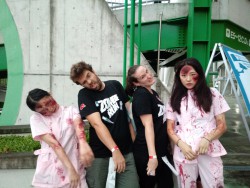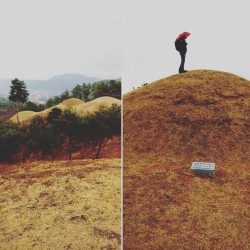- Home » Expat Articles » Interviews » South African Expat Living in South Korea - Interview with Monique and Chris
South African Expat Living in South Korea - Interview with Monique and Chris
| Published: | 7 Aug at 10 AM |
Want to get involved?
Become a Featured Expat and take our interview.
Become a Local Expert and contribute articles.
Get in touch today!
Become a Local Expert and contribute articles.
Get in touch today!
Filed: Interviews,
Monique and Chris are two newly married adventurers, currently living and working in rural South Korea. Having grown up in South Africa, they are both adrenaline junkies, enjoying skydiving, scuba diving, and general craziness. They met when studying Theatre, and have gone on to work together in the theatre industry, most recently co-creating and performing an original work entitled "Timothy Tatters Tea Time Terrible."
Monique and Chris love to travel, and they jumped at the opportunity to become EFL teachers in Korea. Arriving in February of 2017, their goal has been to immerse themselves in Korean culture, trying out all the food, festivals and fun they can find. Monique and Chris's expat blog is called MC Adventure Blog (see listing here)
Where are you originally from?
Pietermaritzburg, South Africa
In which country and city are you living now?
Seongju, Gyeongsanbuk-do, South Korea
How long have you lived in South Korea and how long are you planning to stay?
We have been in Korea since mid-February and we are hoping to renew our one year contract and stay for longer!
Why did you move to South Korea and what do you do?
We are EFL teachers, focussing on teaching conversational English at Korean public schools with the EPIK program. We moved to Korea as we both felt that we had become stagnant in our lives in Johannesburg and really needed a change and an adventure!
Did you bring family with you?
We got married in March 2016, so yes, we brought each other!
How did you find the transition to living in a foreign country?
Moving to Korea was by no means easy, although being a part of the very structured EPIK program has certainly helped. Another great help has been getting into this adventure together, as there is always someone to talk to and someone who really understands the experience right next to you every step of the way. To be honest, the good times and the rush of the change has far outweighed the difficulties!
Was it easy making friends and meeting people; do you mainly socialise with other expats?
There are only 4 foreigners living in Seongju, so we became friends quickly! We also volunteer at our local community centre teaching English to adults, and that group has become our friendship circle here in Seongju. We also made some great friends at the EPIK orientation program, so we try our best to stay in touch and travel together when possible. We have a good mix of expat and Korean friends.
What are the best things to do in the area; anything to recommend to future expats?
Haha, Seongju is tiny! But we do produce all of the Chamoe melons for Korea, so if you like melons, you should come along to our annual festival! We are just a 25 minute bus ride from Daegu, so it is really easy to go in and visit a pet cafe or take in some theatre or art shows.
What do you enjoy most about living in South Korea?
We enjoy the lifestyle here, as our farming town is quiet and calm, but still close enough to a big city when we need to get some shopping or socialising done. We are also loving learning the language and experiencing the great food Korea has to offer!
How does the cost of living in South Korea compare to home?
We think the cost of living is similar, however, as teachers we are earning a considerable amount more here than we were in South Africa. We now have the freedom to travel more often and to start saving serious money for our future, and that is a really awesome.
What negatives, if any, are there to living in South Korea?
The biggest difficulty is that in our small town not a lot of people speak English, so getting things done can be a real challenge!
If you could pick one piece of advice to anyone moving to South Korea, what would it be?
Keep an open mind, be open to change, and most importantly, learn as much of the language as you can!
What has been the hardest aspect to your expat experience so far?
We think it has been getting used to the language and trying to figure out how things work. When you learn Korean, it is not only learning the language but a whole new alphabet!
When you finally return home, how do you think you'll cope with repatriation?
My goodness, that's so difficult to think about! It will be difficult to get used to not having high-speed free internet anymore, that's for sure!
What are your top 5 expat tips for anyone following in your footsteps?
We started our blog as a way to keep our memories of travelling safe and to hopefully create an interesting and relevent record of life in Korea for anyone who is thinking of visiting or moving here. We write about where we travel and what we do, as well as some practical tips to getting around and navigating hospitals, etc.
How can you be contacted for further advice to future expats coming to your area?
You can leave a comment on our blog! Also you can follow our individual instagram accounts: @moniquehilldrama and @lonelybusker
Monique and Chris love to travel, and they jumped at the opportunity to become EFL teachers in Korea. Arriving in February of 2017, their goal has been to immerse themselves in Korean culture, trying out all the food, festivals and fun they can find. Monique and Chris's expat blog is called MC Adventure Blog (see listing here)
Here's the interview with Monique and Chris...
Where are you originally from?
Pietermaritzburg, South Africa
In which country and city are you living now?
Seongju, Gyeongsanbuk-do, South Korea
How long have you lived in South Korea and how long are you planning to stay?
We have been in Korea since mid-February and we are hoping to renew our one year contract and stay for longer!
Why did you move to South Korea and what do you do?
We are EFL teachers, focussing on teaching conversational English at Korean public schools with the EPIK program. We moved to Korea as we both felt that we had become stagnant in our lives in Johannesburg and really needed a change and an adventure!
Did you bring family with you?
We got married in March 2016, so yes, we brought each other!
How did you find the transition to living in a foreign country?
Moving to Korea was by no means easy, although being a part of the very structured EPIK program has certainly helped. Another great help has been getting into this adventure together, as there is always someone to talk to and someone who really understands the experience right next to you every step of the way. To be honest, the good times and the rush of the change has far outweighed the difficulties!
Was it easy making friends and meeting people; do you mainly socialise with other expats?
There are only 4 foreigners living in Seongju, so we became friends quickly! We also volunteer at our local community centre teaching English to adults, and that group has become our friendship circle here in Seongju. We also made some great friends at the EPIK orientation program, so we try our best to stay in touch and travel together when possible. We have a good mix of expat and Korean friends.
What are the best things to do in the area; anything to recommend to future expats?
Haha, Seongju is tiny! But we do produce all of the Chamoe melons for Korea, so if you like melons, you should come along to our annual festival! We are just a 25 minute bus ride from Daegu, so it is really easy to go in and visit a pet cafe or take in some theatre or art shows.
What do you enjoy most about living in South Korea?
We enjoy the lifestyle here, as our farming town is quiet and calm, but still close enough to a big city when we need to get some shopping or socialising done. We are also loving learning the language and experiencing the great food Korea has to offer!
How does the cost of living in South Korea compare to home?
We think the cost of living is similar, however, as teachers we are earning a considerable amount more here than we were in South Africa. We now have the freedom to travel more often and to start saving serious money for our future, and that is a really awesome.
What negatives, if any, are there to living in South Korea?
The biggest difficulty is that in our small town not a lot of people speak English, so getting things done can be a real challenge!
If you could pick one piece of advice to anyone moving to South Korea, what would it be?
Keep an open mind, be open to change, and most importantly, learn as much of the language as you can!
What has been the hardest aspect to your expat experience so far?
We think it has been getting used to the language and trying to figure out how things work. When you learn Korean, it is not only learning the language but a whole new alphabet!
When you finally return home, how do you think you'll cope with repatriation?
My goodness, that's so difficult to think about! It will be difficult to get used to not having high-speed free internet anymore, that's for sure!
What are your top 5 expat tips for anyone following in your footsteps?
- Get yourself the best TEFL course you can, preferably one with an in-class component if you have never taught before. Remember, there are so many TEFL courses out there, you really need to find one that gives you value for money and can give you some practical teaching experience too.
- Learn some Korean before you arrive. The Memrise app is a great free option for this. Having a basic knowledge of Korean will really help you to navigate your first months with less stress.
- If you are a bit curvy, bring lots of pants from home! Koreans are so slim that it is difficult to find larger clothes sizes here. Also remember that showing cleavage and shoulders is a no-no for women, so keep that in mind when shopping.
- Bring some of your favourite toiletries from home. It can be such a comfort to have toothpaste and deodorant that you like when everything else is new and unusual.
- Get ready for an intense and humid Summer. Don't assume you know what Summer is like because you grew up in Africa, Korea is insanely hot and humid! Be mentally prepared to sweat yourself silly and bring light and cool clothing.
We started our blog as a way to keep our memories of travelling safe and to hopefully create an interesting and relevent record of life in Korea for anyone who is thinking of visiting or moving here. We write about where we travel and what we do, as well as some practical tips to getting around and navigating hospitals, etc.
How can you be contacted for further advice to future expats coming to your area?
You can leave a comment on our blog! Also you can follow our individual instagram accounts: @moniquehilldrama and @lonelybusker
Grab a featured expat badge that links to this interview!
 Copy and paste code to display the Featured Expat Badge:
Copy and paste code to display the Featured Expat Badge:Comments » No published comments just yet for this article...
Feel free to have your say on this item. Go on... be the first!


 Monique and Chris is a South African expat living in South Korea. Blog description: A travelling couple planning to see the world! Currently EFL teachers in South Korea.
Monique and Chris is a South African expat living in South Korea. Blog description: A travelling couple planning to see the world! Currently EFL teachers in South Korea.





